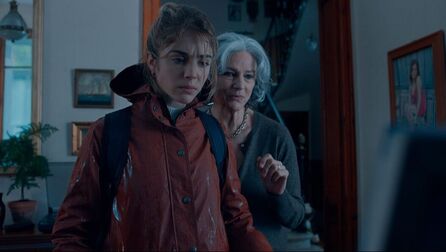 “You deserve a beautiful romance…” …That’s true. We all do. Everyone deserves to love and feel loved. For as long as stories have been told, romance has been at the heart of many of them. Love sometimes comes from unexpected places, and in director Baptiste Drapeau’s The Lodger, which just premiered at the Chattanooga Film Festival, love even comes from beyond the grave. Written by Drapeau, Ollivier Briand and Mauricio Carrasco, The Lodger is a French ghost story following Julie (Alice Isaaz), a young woman attending university to become a nurse. To save on cost, she rents a room with Elizabeth (Jacqueline Bisset), an old woman still mourning her deceased husband Victor (Francois-Dominique Blin)…to the point where she talks about him as if he’s still around, and keeps outfits of his lying around in chairs and on the bed as if he’s occupying those spaces. Julie humors Elizabeth, thinking it harmless, until she starts to feel the presence of Victor herself, and finds herself developing a deep attraction to him. It wouldn’t be much of a stretch to say that The Lodger depicts one of the strangest love triangles I’ve ever seen on film, yet it’s handled with a romantic elegance you may not expect based on the premise alone. Opening on a shot of a cross in a cemetery that slowly pulls away as an enchanting, fairy-tale score fills the scene, Drapeau invites us into a well-crafted tale that immediately feels like a more classical ghost story, eschewing brooding atmosphere and cheap scares for an experience drenched in magical romanticism. Julie herself comes off like a character straight out of a poet’s heart. Isaaz emits a glow of joyful radiance that reminded me a bit of Mia Farrow, embodying a dreamer, full of hope and a positive outlook on the future. Unlike in The Boy, which shares a few small similarities to The Lodger—namely, Julie making the terrible decision of dressing a mannequin in Victor’s clothes—Julie passes no judgement on Elizabeth. She’s a kind soul, who instead offers Elizabeth a gentle understanding that no one else seems to. To others, Elizabeth is a creepy old bag, but to Julie, a romantic herself, Elizabeth is a harmless woman who simply misses her husband, and would rather not let go. Isaaz brings such a lovely warmth to the role, that, despite the eeriness of the situation, the audience is put at ease by her own acceptance of it. Bisset is also exceptional. Set twenty years after the death of the love of her life, Bisset portrays a deep sadness that allows for more empathy than distrust. It would be easy to judge her the way the townspeople in the film do, but I found myself feeling sorry for her more often than not, which isn’t to say that Bisset can’t be unsettling at times. She is, incredibly so, emitting something dark and sinister behind her eyes. At first, Elizabeth and Julie are like perfect companions, developing a mother-daughter relationship that is sweet and endearing, and lets us forget that there is something seriously wrong in this house. You know, like a mannequin in Victor’s clothes that always seems as if it’s watching Julie. Or the doors that open and close on their own. And did that mannequin just smoke a cigarette? The Lodger burns slowly, like a soft candle surrounded by rose petals, with methodical direction from Drapeau that eases us into the story, letting us fall in love with these characters. The filmmakers aren’t aiming for screams or an overwhelming sense of dread here—though there are a few moments that made me gasp—instead delivering a dreamy film overtaken by a romantic eroticism. Creepy as all get out mannequin aside, there is a magnetism to the version of Victor which Julie dreams of. She isn’t like others her age, wanting someone more mature and charming, and so she clings to the fantasy version of Victor which she creates in her mind. The Lodger speaks to the way in which we as humans fall in love, embracing the audience with a lover’s grasp. We are sucked into Julie’s fantasy just as she is, and part of the brilliance of this odd love story is in how the filmmakers force us to question how much of this is real. Is Victor’s ghost truly present, or is he simply in Julie’s mind, the memory of a man created by a few photos and Julie’s own wants and needs in a partner? Drapeau’s film is a graceful one, with layers stacked on layers like soft satin sheets in a couple’s bed, and complicated characters searching for a love to fill the empty part of their hearts. This is an old-fashioned love story with a ghost, where the tension comes not necessarily from Victor himself, but from jealousies and betrayals that threaten to destroy the characters. The Lodger strikes at the importance of trying not to forget the loved ones we’ve lost, while also knowing when we must let go. This film has all of the romanticism of a sweet love letter, written in the sinister ink of an eerie ghost story. Character motivations can be a bit murky at times, and some of you probably won’t find the mystery of it all that mysterious, but The Lodger is much more about the journey than the destination. It won’t please those expecting a haunting spookfest, but The Lodger is the perfect date movie for you creepy couples, whether your partner is a living human, or a plastic mannequin. Love is love. By Matt Konopka
1 Comment
4/18/2024 11:39:26 am
I wanted to express my gratitude for your insightful and engaging article. Your writing is clear and easy to follow, and I appreciated the way you presented your ideas in a thoughtful and organized manner. Your analysis was both thought-provoking and well-researched, and I enjoyed the real-life examples you used to illustrate your points. Your article has provided me with a fresh perspective on the subject matter and has inspired me to think more deeply about this topic.
Reply
Leave a Reply. |
Archives
March 2023
|


 RSS Feed
RSS Feed